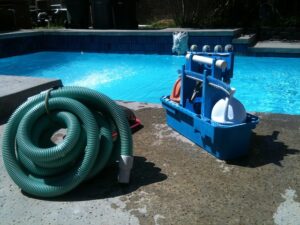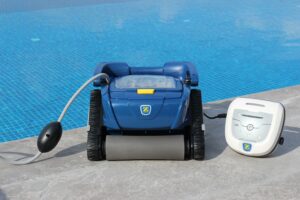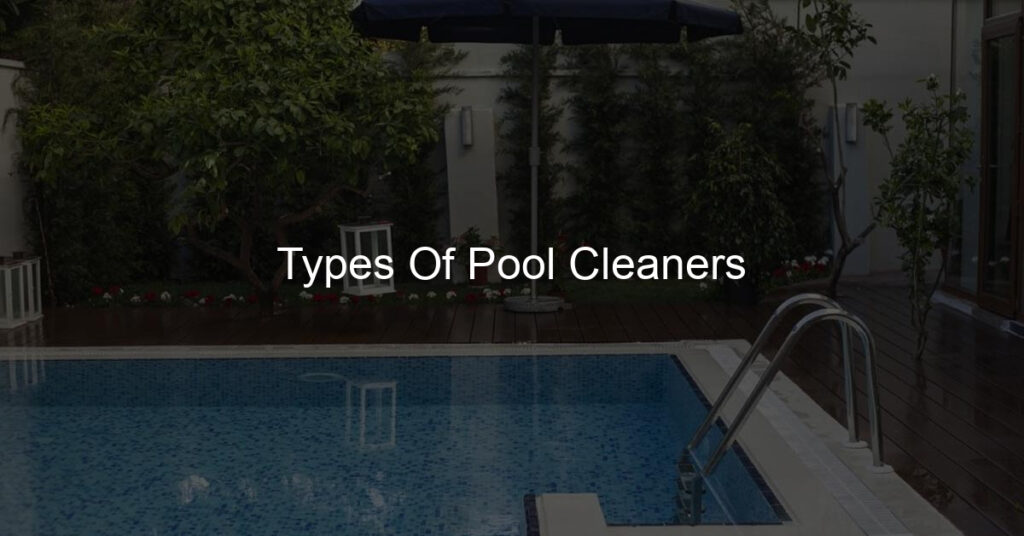Call it a case of déjà vu for many pool owners. Whether you’ve been cleaning your own private pool for years or just got one, sooner or later you’ll probably find yourself with cloudy, greenish water that is starting to look dirty and uninviting. Sooner or later, every pool owner in the world will probably find themselves in this predicament.
That’s because most people don’t realize that maintaining a proper pool can be pretty taxing on the system as well as its filter and other components. The good news is that there are many remedies available once you understand what the problem is and how best to fix it.
To help you get started, here are some of the most common reasons why your pool may not look as sparkling as it should:
What are pool cleaners called?
A pool cleaner is typically a machine that uses water and chemicals to help clean your pool. There are many types of these cleaners, from manual to motorized kind.
#1: Pool Water Is Cloudy
The first thing you should do if you’re noticing cloudy pool water is check the filter. The filter may be clogged or broken, which means it simply cannot filter out all the dirt. If this is the case, you will have to replace or fix it as soon as possible.
#2: You’re Using Too Many Chemicals
Some people use too much chlorine in their pools, which can cause algae and scum to build up on the walls. This can lead to an overabundance of chlorine in your pool, which also causes cloudy water. These two problems don’t just go away on their own; they actually get worse with time as more and more chemicals are used to fight them off. In order to keep your pool properly balanced, you’ll need to reduce the number of chemicals being used.
Types Of Pool Cleaners
| Pool Cleaner | Type | Description | Pros | Cons |
|---|---|---|---|---|
| Baracuda G3 W03000 | Suction | This suction pool cleaner is designed to clean in-ground pools of all sizes and shapes. It features a long-life diaphragm and a quiet operation. | Effective cleaning, affordable price, quiet operation. | May not clean stairs and walls as well as some other types of pool cleaners. |
| Polaris 280 | Pressure | This pressure pool cleaner is designed to clean in-ground pools. It features a powerful booster pump and a large debris bag. | Effective cleaning, can clean stairs and walls, large debris bag. | Higher price, requires a booster pump. |
| Dolphin Nautilus CC Plus | Robotic | This robotic pool cleaner is designed to clean in-ground pools up to 50 feet in length. It features a large debris canister and a smart navigation system. | Effective cleaning, does not require a booster pump or pool’s pump and filter system, smart navigation system. | Higher upfront cost, may require periodic maintenance. |
Nothing beats a hot summer day spent in your pool. Whether you’re swimming laps to stay fit, playing tag with the kids, or just relaxing with some friends, there’s nothing quite like it. But while pools are fun and enjoyable, they need to be taken care of properly.
The key to this is having the right pool cleaner on hand so that your pool remains clean and safe all season long. In this blog post, we’ll cover the different types of cleaners available today so that you can make an informed decision as to which one will work best for your needs!
Manual Pool Vacuum
Maintaining your pool’s water quality is an essential task for any avid swimmer or hobbyist. The key to a healthy and enjoyable swimming experience is using the right equipment, such as a manual pool vacuum. This helpful tool can take much of the time and effort out of cleaning your pool, allowing you to get back in the water quickly after giving it a thorough clean.
When it comes to keeping your pool clean, there are two main types of pool vacuums to choose from: manual and automated. Manual pool vacuums require physical labor to operate, but they also provide you with more control and can be less expensive. On the other hand, automated pool vacuums do the work for you, saving you time and energy. However, they can be pricier and may require more maintenance.
The decision depends on your personal preferences and budget. As long as you are investing in a high-quality product that meets your needs, both manual and automated pool vacuums can effectively keep your pool crystal clear.
What is the best cleaning system for a pool?
One of the most common problems with a pool is cloudy water. Cloudy water can be caused by leaves, dirt, and other debris. This can clog the filter system and eventually stop it from working properly.
The best cleaning method for a pool is to use a power-washing system with an ozone generator. Ozone generators are portable units that need to be plugged into an outlet. Ozone generators clean up your pool in about five hours, which is basically half of what you would need if you were using chemicals.
Another advantage of using a power washing system is that it also kills any bacteria or algae that may be present in your pool’s water as well as reduces the amount of chlorine you need to add to keep the water sanitary. These systems also allow users to control their own cleaning process while they are working on their private swimming pool so they feel more in control of the process.
Robotic Pool Cleaner

A robotic pool cleaner is an ultimate solution to keeping your pool clean and tidy without any hassle. With its advanced technology, this innovative device guarantees to scrub every inch of your pool, reaching even the hard-to-reach corners. Its advanced sensors can detect and navigate obstacles and its powerful suction and filtration system ensures that your pool will be crystal clear and hygienic.
The best part? This smart machine is completely automatic, so you can sit back and relax while it does all the hard work for you. Say goodbye to manual pool cleaning and hello to a hassle-free, sparkling-clean pool with a robotic pool cleaner.
Can you leave the robotic pool cleaner in the pool?
Have you ever wondered if it’s safe to leave your robotic pool cleaner in the water overnight? The answer is yes! These machines are designed to be left in the pool for extended periods without causing any harm. In fact, leaving your robotic pool cleaner in the water might be beneficial as it allows for continuous cleaning, maintaining your pool’s cleanliness throughout the day and night.
However, it’s essential to ensure that your pool cleaner is designed for long-term use and that you follow the manufacturer’s instructions for the optimal care and maintenance of your pool cleaner. With the right precautions, you can leave your robotic pool cleaner in the pool without worrying about any negative consequences.
Is a robotic pool cleaner worth it?
Keeping your pool in top-notch shape can be quite a chore, but with the help of a robotic pool cleaner, the task becomes nearly effortless. With its advanced technology, a robotic pool cleaner can scrub away dirt, leaves, and even algae, leaving your pool sparkling clean in no time.
While the initial cost may seem daunting, many pool owners swear by the convenience and time savings that come with investing in a robotic pool cleaner. Plus, with their energy-efficient design, you may even see a reduction in your monthly energy bills. So, if you’re tired of spending hours cleaning your pool each week, it may be worth considering whether a robotic pool cleaner is right for you.
How do you use pool suction cleaner?

If you’re the owner of a sparkling backyard pool, you know the importance of a good pool cleaner. A suction cleaner is an efficient and cost-effective way to keep your pool free of debris and dirt. Using a pool suction cleaner is not complicated, but it’s important to do it correctly to avoid any potential damage to the machine or your pool.
To use it, attach the suction cleaner to your pool’s skimmer or dedicated suction line. Then connect it to a vacuum hose and let it do its job. The suction generated by the cleaner will enable it to travel around your pool and collect all kinds of dirt and debris. With a little bit of attention and care, a pool suction cleaner will help keep your pool looking crystal clear all season long.
How often should I run my suction pool cleaner?
If you’re the proud owner of a suction pool cleaner, you may find yourself wondering how often you should run it. Generally, it’s recommended to run your suction pool cleaner once a day for the best results. However, the frequency of use can vary depending on factors such as pool size, usage, and debris accumulation.
If you have a lot of trees surrounding your pool or experience a lot of foot traffic, you may want to consider running your suction pool cleaner more frequently to keep it in top shape. Ultimately, the key to keeping your pool sparkling clean is regular maintenance, which includes running your suction pool cleaner consistently.
How does a pressure pool cleaner work?

Are you tired of constantly vacuuming your pool? A pressure pool cleaner might just be the answer to your prayers. These cleaners work by utilizing the pressure from your pool’s water pump to move around the pool and collect debris.
The water is forced into the cleaner and out through the rear vent, creating pressure that propels the cleaner around the pool. As it moves, the cleaner sucks up dirt and leaves into its filter bag, leaving your pool sparkling clean. With a pressure pool cleaner, you can sit back, relax, and let the technology do the work for you.
How long does a pressure pool cleaner last?
One common question that pool owners have is regarding the lifespan of their pressure pool cleaners. While it can vary depending on the specific model and usage, a well-maintained pressure pool cleaner typically lasts anywhere from three to five years.
Regular maintenance such as checking and cleaning the filter, ensuring proper hose length, and replacing worn-out parts can help extend the life of your cleaner. It’s important to keep in mind that overusing or neglecting maintenance can cause premature wear and tear, leading to a shorter lifespan. Ultimately, investing in a quality pressure pool cleaner and keeping up with proper maintenance will help you get the most out of your investment.
What is the difference between a suction and pressure pool cleaner?
It’s important to know the differences between suction and pressure pool cleaners. If you have a suction cleaner, it will suck up dirt from your pool on its own without having to apply any extra pressure. A pressure pool cleaner requires more manual work and exertion on your end.
A pressure cleaner has a motor that delivers power from a hand pump, whereas a suction cleaner does not have a motor.
Both types of cleaners take out debris with the help of water pressure, but the type of cleaner you use depends on what suits your needs better.
Which is better robotic or suction pool cleaner?
Both robotic and suction pool cleaners are effective, but they have their pros and cons. For instance, the suction cleaners can be more expensive in the short term but they save on buying filters more often. In contrast, robotic pool cleaner requires less maintenance than suction cleaners since they do not require you to clean them as often.
Robotic and suction pool cleaners both range in price depending on how much time you want to put into maintaining it as well as what type of pool it is. If you live alone with a small pool, then you might want to go with robotic cleaners since they are less costly and require less time.
Conclusion:
From the discussion above, it is clear that the decision to use a robotic pool cleaner is ultimately up to you; however, these automated pool cleaners can be extremely helpful in keeping your pool clean. Additionally, suction cleaners are widely used, and they are inexpensive and at the same time reliable for regular maintenance of your swimming pool. Pressure cleaners work by being attached to a hose system and then moved around the interior of the pool.
Finally, keep in mind that pressure cleaning systems last longer than their suction counterparts and may require fewer repairs over time. Ultimately, no matter what type of pool cleaner you decide on, make sure to read up on all regularly scheduled maintenance plans and proceed accordingly. That way you will know exactly how often you should run your chosen machine for optimal results – not only for effective cleaning but also long-term durability!














